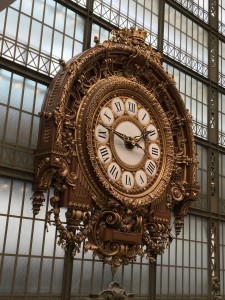
Photo: Mary van Balen
Kathryn and I successfully navigated the Metro this morning and made our way to the Musée d’Orsay. Originally it was a railway station that included a hotel and reception room, but as train transportation changed, the station was gradually abandoned. In 1977 the French government decided to transform the buildings into a museum, and by 1986 it was opened to the public. With huge clocks and vaulted ceilings, the building itself is breathtaking. And then, of course, there is the magnificent collection it holds.
Once there, we quickly made our way up to the 5th floor that houses works by the Impressionists. I immediately recognized some of the paintings, and my eyes filled with tears. Monet, Manet, Renoir, Degas, Cézanne, Pissaro, Sisley… The emotional connection was immediate.
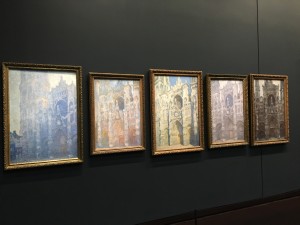
Series La Cathedrale de Rouen Claude Monet Photo: Mary van Balen
Standing in front of Monet’s series of paintings of the Cathedral of Rouen, I imagined the man, coming to the church day after day, at different times, to capture the light. What sight he had. I was reminded of a conversation with artist Marvin Triguba, years ago:
“Marvin,” I asked, “how do you paint the light that makes everything so alive, so real?” “It’s how I see,” he answered. “I see everything like that. Doesn’t everyone see that way?”
The paintings draw crowds of people from around the world. Some stand and gaze for a long while. Others take quick photos and move on. All, for a moment, experience the world through the artist’s eyes and heart.
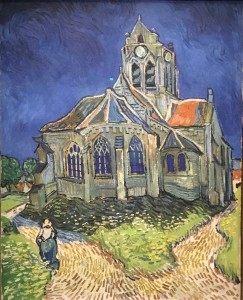
L’Englise d’Auvers-sur-Oise van Gogh
Photo; Mary van Balen
As I walked through the rooms there and in the Neo-Impressionism wing, I wondered at the subject matter—so ordinary and yet, as the artist reveals, extraordinarily beautiful and transcendent. There was one of snow on Paris rooftops, a yard full of white turkeys, a haystack, a vase of flowers, a picnic, a train station, a woman with a parasol, a table set for tea. Someone hurrying down a lane past a church, and a starry night.

Photo: Mary van Balen
Everyday sights. I thought about the kiwi and nectarines Kathryn cut up and placed in a white bowl for breakfast this morning. Baguette broken and buttered. Grey clouds threatening rain hanging over the the city.
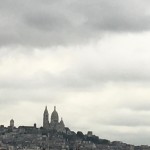
View of Sacré-Cœur from Musée d’Orsay
The couple van Gogh painted walking beneath the dark blue sky studded with brilliant stars, did they notice what glory hung above their heads? Did the woman hurrying around the cathedral notice the sunlight on the roof or the grass along the road?
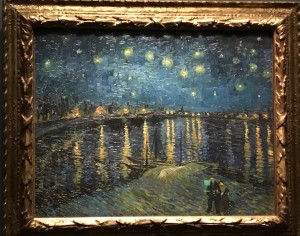
Starry Night Over the Rhone by Vincent van Gogh
Photo: Mary van Balen
If, as Emily in “Our Town” did when she returned to relive one day, we appreciated the beauty of life at every moment, how could we do anything but appreciate? How could we do anything other than respond as our gifts dictated: paint, dance, write, draw, play music, pray? Or, simply stand still and open every pore to the Grace that constantly overflows around us, in us, and through us?
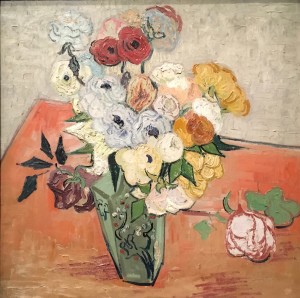
Roses and Anemones by Vincent van Gogh
Photo: Mary van Balen
Today, I gave thanks for artists who have reminded us of the Sacred present in our midst. Thanks for those who recognize the value of their work, collect it, preserve it, and make places where we can come to see and be reminded that we move through wonder every day.








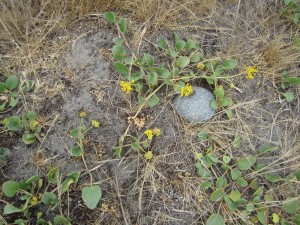
 The poem is “Roses.” Oliver writes of the quest to answer life’s “big questions” and decides to ask the wild roses if they know the answers and might share them with her. They don’t seem to have time for that. As they say, “…we are just now entirely busy being roses.”
The poem is “Roses.” Oliver writes of the quest to answer life’s “big questions” and decides to ask the wild roses if they know the answers and might share them with her. They don’t seem to have time for that. As they say, “…we are just now entirely busy being roses.”
 Happy poetry month! I was pleased to see Ted Kooser, former US Poet Laureate
Happy poetry month! I was pleased to see Ted Kooser, former US Poet Laureate  During one of his presentations he had made the generous offer of sending a valentine poem to anyone who’d like to receive one. He’d been doing it for years, he explained. I gave him my daughters’s address and my own. Sure enough, when Valentine’s Day came around we both received a postcard from Ted Kooser, postmarked in Valentine, Nebraska. It hangs, framed on my office wall.
During one of his presentations he had made the generous offer of sending a valentine poem to anyone who’d like to receive one. He’d been doing it for years, he explained. I gave him my daughters’s address and my own. Sure enough, when Valentine’s Day came around we both received a postcard from Ted Kooser, postmarked in Valentine, Nebraska. It hangs, framed on my office wall.
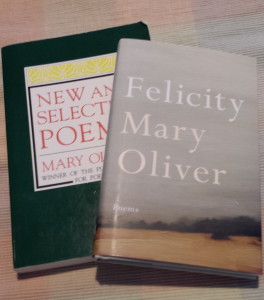 My day was off to a confused start. It was the time change. Usually, the clock by my bed adjusts for moving into or out of daylight savings time, but not this morning. Or maybe I just read it wrong. I hurried, washed my hair, and drove to church. No one was there. That’s when I realized: Daylight savings time was back. Sigh. Not a fan.
My day was off to a confused start. It was the time change. Usually, the clock by my bed adjusts for moving into or out of daylight savings time, but not this morning. Or maybe I just read it wrong. I hurried, washed my hair, and drove to church. No one was there. That’s when I realized: Daylight savings time was back. Sigh. Not a fan.




 Bright sun was a welcome change from the grey overcast days we’d been having. I hurried along the sidewalk, passing upscale condos along the street adjacent to the downtown parking lot where my car waits everyday while I’m at work. The brown sandstone cathedral sits just across the street. I thought about dropping in, but opted for the church of buildings and people, cars and cracked sidewalks instead. The cathedral would be locked anyway.
Bright sun was a welcome change from the grey overcast days we’d been having. I hurried along the sidewalk, passing upscale condos along the street adjacent to the downtown parking lot where my car waits everyday while I’m at work. The brown sandstone cathedral sits just across the street. I thought about dropping in, but opted for the church of buildings and people, cars and cracked sidewalks instead. The cathedral would be locked anyway.
